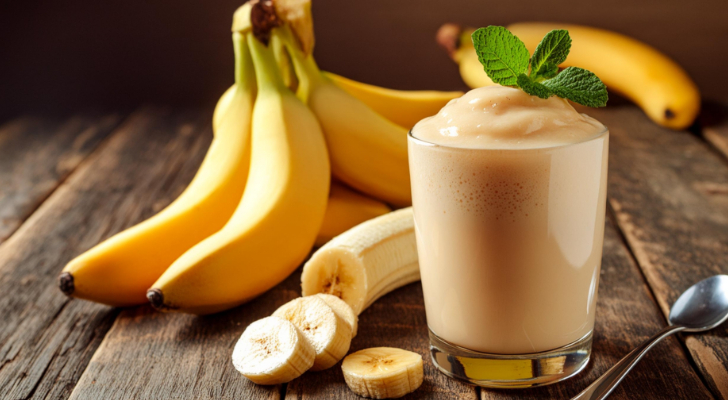
Bananas are one of the most popular fruits worldwide, known for their convenience, taste, and health benefits. As they ripen, their flavor becomes sweeter, and their texture softens, making them perfect for a variety of culinary uses. But what happens when your bananas get too ripe? Instead of tossing them out, let’s explore the benefits of eating ripe bananas and some creative ways to use those overripe ones.
5 Benefits of Eating Ripe Bananas
- High Nutritional Value: Ripe bananas are packed with essential nutrients, including potassium, vitamin C, vitamin B6, and dietary fiber. Potassium is crucial for maintaining healthy blood pressure and heart function, while vitamin B6 aids in brain health and reduces the risk of cardiovascular disease.
- Easily Digestible: As bananas ripen, their starches break down into simple sugars like glucose, fructose, and sucrose, making them easier to digest. This natural sweetness is ideal for those needing a quick energy boost, such as athletes or anyone in need of a healthy snack.
- Antioxidant-Rich: Ripe bananas contain higher levels of antioxidants compared to their green counterparts. Antioxidants help fight free radicals in the body, reducing oxidative stress and potentially lowering the risk of chronic diseases.
- Natural Mood Booster: Bananas are a good source of tryptophan, an amino acid that the body converts into serotonin. Serotonin is known as the “feel-good” neurotransmitter, which helps improve mood and reduce stress.
- Supports Digestive Health: The dietary fiber in bananas, particularly pectin, aids digestion by helping to regulate bowel movements and reduce constipation. Ripe bananas are also soothing for the stomach, making them a gentle choice for those with digestive issues.
What to Do with Overripe Bananas
When bananas get too ripe, they might not be appealing to eat on their own, but they are far from wasted. Here are some delicious and practical ways to use overripe bananas:
Banana Bread: The classic use for overripe bananas is to make banana bread. The natural sweetness and moisture from the ripe bananas make the bread tender and flavorful. You can also add nuts, chocolate chips, or dried fruits for extra texture and taste.
Smoothies: Overripe bananas are perfect for smoothies. Their sweetness can balance out other ingredients, like spinach or kale, and their creamy texture adds a rich consistency. Combine them with berries, yogurt, and a splash of almond milk for a nutritious breakfast or snack.
Banana Pancakes: Mash an overripe banana and mix it with eggs and oats to create quick and healthy banana pancakes. This simple recipe is gluten-free, and the bananas add natural sweetness, meaning you might not need syrup.
Banana Ice Cream: Freeze overripe banana slices and blend them into a creamy, dairy-free ice cream. You can add flavors like cocoa powder, vanilla extract, or peanut butter to create a delicious and guilt-free dessert.
Baking Substitute: Overripe bananas can be used as a natural sweetener or a butter substitute in baking recipes. Use mashed bananas in cookies, muffins, or cakes to reduce the amount of sugar and fat while adding moisture and flavor.
Banana Chips: If you prefer a crunchy snack, you can slice overripe bananas thinly and bake them into banana chips. Lightly coat them with lemon juice to prevent browning and bake them at a low temperature until crisp.
Compost: If you have no immediate use for overripe bananas, they make excellent compost material. Bananas break down quickly and add essential nutrients like potassium and phosphorus to the soil, benefiting your garden.
Freezing Bananas
Freezing ripe bananas is a great way to preserve them for future use, especially in smoothies, baking, or making banana ice cream. Here are some tips to help you freeze ripe bananas effectively:
1. Choose the Right Ripeness:
Bananas that are fully ripe with a few brown spots are ideal for freezing. They should be sweet and soft but not overly mushy.
2. Peel Before Freezing:
Always peel the bananas before freezing them. Once frozen, the peel becomes tough and difficult to remove, which can be a hassle when you want to use the bananas later.
3. Slice or Leave Whole:
- Sliced Bananas: Cut the bananas into even slices (about ½ to 1 inch thick) before freezing. This makes it easier to blend them into smoothies or incorporate them into recipes without having to thaw the whole banana.
- Whole Bananas: You can also freeze whole bananas if you plan to use them in baking or for making banana ice cream. However, slicing them beforehand allows for more versatility.
4. Pre-Freeze on a Baking Sheet:
Arrange the banana slices or whole bananas in a single layer on a baking sheet lined with parchment paper. Ensure the pieces are not touching each other. Freeze for 1-2 hours, or until the bananas are solid. This step prevents the bananas from sticking together when stored.
5. Store in Airtight Containers or Bags:
Transfer the pre-frozen bananas to a freezer-safe airtight container or a zip-top freezer bag. Remove as much air as possible from the bag before sealing it. This helps prevent freezer burn and keeps the bananas fresh for longer.
6. Label and Date:
Label the container or bag with the date you froze the bananas. This will help you keep track of how long they’ve been in the freezer. Frozen bananas are best used within 2-3 months, but they can last longer if stored properly.
7. Use Frozen Bananas Directly:
You don’t need to thaw frozen bananas before using them in smoothies or ice cream. However, if you’re using them in baking, let them thaw at room temperature for a few minutes to soften, or microwave them for a short burst.
8. Prevent Browning:
To prevent slight browning that can occur during freezing, you can toss the banana slices in a little lemon juice before freezing. This step is optional, as a little browning doesn’t affect the taste or usability of the bananas.
9. Freezer-Friendly Banana Mixes:
Consider freezing bananas with other ingredients like berries or spinach in pre-portioned smoothie packs. This way, you can simply grab a bag from the freezer and blend for a quick and nutritious smoothie.
Conclusion
Ripe bananas are not just a convenient snack; they are a powerhouse of nutrients that can boost your health in various ways. When your bananas get too ripe, don’t let them go to waste. From banana bread to smoothies, pancakes to ice cream, there are countless ways to turn overripe bananas into something delicious and nutritious. Embrace the sweetness of ripe bananas and get creative in the kitchen!


